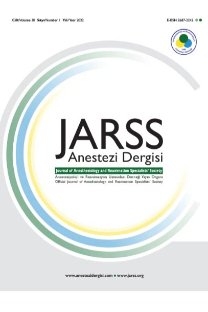Herediter anjiyoödem: Klasik antiödem tedaviler işe yaramaz
Anjiyoödem, kalıtsal, Kompleman C1, Orta yaşlı, Kadın, Danazol
___
1. Waytes AT, Rosen FS, Frank MM. Treatment of hereditary angiöedema with a vapor-heated C1 inhibitor concentrate. N Engl J Med. 1996; 334:1630-1634.2. Farkas H, Harmat G, Fust G, et al. Clinical management of hereditary angio-oedema in children. Pediatr Allergy Immunol. 2002; 13: 153-161.
3. Pruet CW, Kornblut AD, Brickman C, et al. Management of the airway in patients with angioedema. Laryngoscope. 1983; 93: 749-755.
4. Nujjens JH, Agostoni A, Aygoren-Pursun E, et al. Hereditary and acquired angioedema: problems and progress: proceedings of the third Cl esterase inhibitor deficiency workshop and beyond. J Allergy Clin Immunol 2004; 114:S51-131.
5. Davis AE. The pathophysiology of hereditary angioedema. Clin Immunol. 2005; 114:3-9.
6. Agostoni A, Cicardi M. Hereditary and acquired Cl-inhibitor deficiency: biological and clinical characteristics in 235 patients. Medicine (Bal timore) 1992; 71:206-215.
7. Cugno M, Bergamasehini L, Uziel L, et al. Haemostasis contact system and fibrinolysis in hereditary angioedema. J Clin Chem Clin Biochem 1988; 26:423-427.
8. Frank MM. Complement in the pathophysiology of human disease. N Engl J Med. 1987; 316: 1525-1530.
9. Anderson MW, deShazo RD. Studies of the mechanism of angiotensinconverting enzyme (ACE) inhibitor-associated angioedema: the effect of an ACE inhibitor on cutaneous responses to bradykinin, codeine, and histamine. J Allergy Clin Immunol. 1990;85:856-858.
10. Nielsen EW, Johansen HA, Hogasen K, et al. Activation of the complement, coagulation, fibrinolytic and kallikrein-kinin systems during attacks of hereditary angioedema. Immunopharmacology. 1996; 3
- ISSN: 1300-0578
- Yayın Aralığı: Yılda 4 Sayı
- Başlangıç: 1993
- Yayıncı: Betül Kartal
Epidural anestezi sonrası baş ağrısı
Özlem Selvi CAN, Ali Abbas YILMAZ, Esra AKGÜN, Neslihan ALKIŞ, Asuman UYSALEL
Kardiyopulmoner baypasta anestezinin rolü nedir? Anestezi yöntemi nasıl olmalıdır?
Kaygı düzeyi yüksek çocuklarda oral midazolam premedikasyonu: farklı dozların etkinliği
Berrin IŞIK, ÖZGÜL BAYGIN, CENGİZ HALUK BODUR
Gebe tavşanlarda bupivakainin oluşturduğu epileptiform EEG aktivitesi üzerine efedrinin etkisi
Petek ÖYEKCİN, Semih KÜÇÜKGÜÇLÜ, Mustafa AKHİSAROĞLU, Atalay ARKAN
Trioit fizyolojisi ve tiroit fonksiyon testleri
Trakeal basısı olan planjon guatrlı akromegalık hastanın tirodiktomi operasyonunda anestezi yönetimi
BÜLENT ATİK, Ercan KURT, Ferruh BİLGİN
Karotis endarterektomi cerrahisinde lokal anestezinin önemi
Pompa başlangıç solüsyonunda yanlış kan kullanımına bağlı transfüzyon komplikasyonu
Yasin ALIÇ, Elif A. AKPEK, Aslı DÖNMEZ, Süleyman ÖZKAN, Güray YENER, MEHMET SAİT AŞLAMACI
Spinal Menenjiom: Bel-bacak ağrısının ayırıcı tanısına dikkat
E. Aysu ŞALVIZ, Yeşim ATEŞ, Cenk AKBOSTANCI
